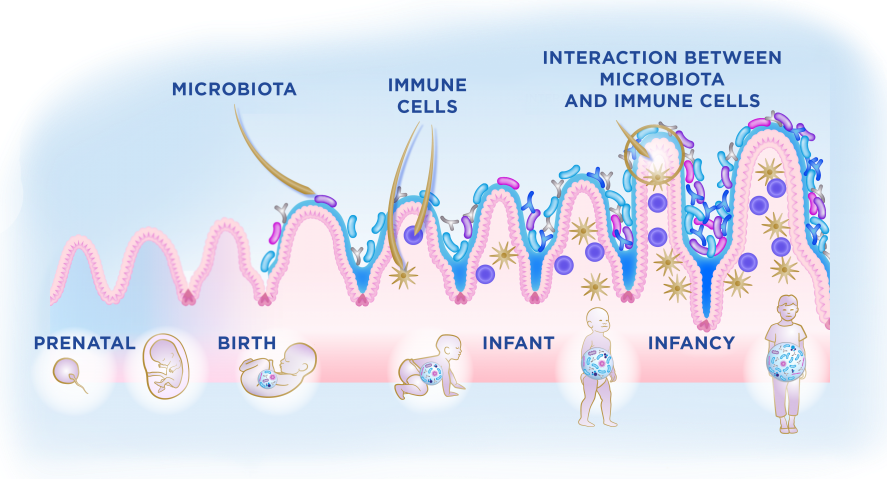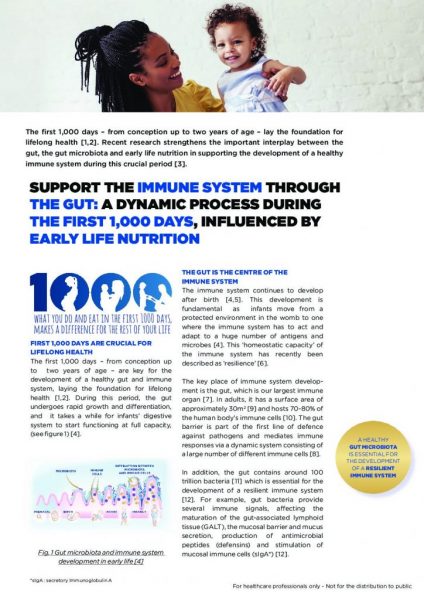With the right nutrients and healthy eating habits from birth, the baby will develop good gut health and a strong immune system. This will stand it in good stead as it moves into adult life and is exposed to external factors that may affect health in later life.
A child’s first 1,000 days – the period from conception up to two years – are key when it comes to the development of a healthy gut and immune system, laying the foundations for lifelong health1,2. During this period, a baby’s gut undergoes rapid growth and differentiation and it takes some time for an infant’s digestive system to start functioning at full capacity (see fig. 1)4.

THE GUT IS THE CENTRE OF THE IMMUNE SYSTEM
A baby’s immune system continues to develop after birth4,5. This development is fundamental as infants move from a protected environment in the womb to one where the immune system has to act and adapt to a huge number of antigens and microbes in the outside environment during the first year and beyond4. This ‘homeostatic capacity’ of the immune system has recently been described as ‘resilience’6.
EARLY LIFE NUTRITION TRAINS THE IMMUNE SYSTEM
During a child’s first 1,000 days, environmental factors, such as stress, smoking, medication and if the mother has a high BMI*, can influence the infant’s gut microbiota13. Early life nutrition, good health and sufficient nutrients will all enable a healthy immune system and gut microbiota to develop, despite these external factors3. Specific nutritional components can selectively stimulate the growth and activity of the gut microbiota, thereby impacting the gut microbiota colonisation and maturation of the gut and immune system7. This is known to be a dynamic process during a child’s first 1,000 days, influencing lifelong health4.
HUMAN BREAST MILK OFFERS BEST NUTRITION FOR INFANTS
The best source of nutrients in an infant’s early life is human breast milk, which also supports the development of the gut microbiota and immune system8-11. The beneficial effects of breastfeeding are due to many bioactive compounds, oligosaccharides and low levels of bacteria (e.g. Streptococci, Lactobacilli and Bifidobacteria). Metabolites that are naturally present in human milk also seem to play a key role in the immune system through the gut12. In the first year of life, breastfeeding an infant will encourage optimal growth and good health and will supply the baby with all the essential nutrients it needs.

Infographic: The development of the gut microbia during the first 1,000 days
References
- Godfrey, Keith M., Peter D. Gluckman, and Mark A. Hanson. “Developmental origins of metabolic disease: life course and intergenerational perspectives.” Trends in Endocrinology & Metabolism 21.4 (2010): 199-205.
- Bischoff, Stephan C. “‘Gut health’: a new objective in medicine?.” BMC medicine 9.1 (2011): 24.
- Prentice, Sarah. “They Are what You eat: Can Nutritional Factors during Gestation and early infancy Modulate the Neonatal immune Response?.” Frontiers in immunology 8 (2017): 1641.
- Wopereis, Harm, et al. “The first thousand days–intestinal microbiology of early life: establishing a symbiosis.” Pediatric Allergy and Immunology 25.5 (2014): 428-438.
- Martín, Virginia, et al. “Inhibition of human immunodeficiency virus type 1 by lactic acid bacteria from human breastmilk.” Breastfeeding Medicine 5.4 (2010): 153-158.
- Sommer, Felix, et al. “The resilience of the intestinal microbiota influences health and disease.” Nature Reviews Microbiology 15.10 (2017): 630.
- McKenzie, Craig, et al. “The nutrition‐gut microbiome‐physiology axis and allergic diseases.” Immunological reviews 278.1 (2017): 277-295.
- Brand-Miller, Janette C., et al. “Digestion of human milk oligosaccharides by healthy infants evaluated by the lactulose hydrogen breath test.” The Journal of pediatrics 133.1 (1998): 95-98.
- Engfer, Meike B., et al. “Human milk oligosaccharides are resistant to enzymatic hydrolysis in the upper gastrointestinal tract.” The American journal of clinical nutrition 71.6 (2000): 1589-1596.
- Fernández, L., et al. “The microbiota of human milk in healthy women.” Cellular and molecular biology (Noisy-le-Grand, France) 59.1 (2013): 31-42.
- Bergmann, Henrike, et al. “Probiotics in human milk and probiotic supplementation in infant nutrition: a workshop report.” British Journal of Nutrition 112.7 (2014): 1119-1128.
- Scholtens, Petra AMJ, et al. “The early settlers: intestinal microbiology in early life.” Annual review of food science and technology 3 (2012): 425-447.
- Munyaka, Peris Mumbi, Ehsan Khafipour, and Jean-Eric Ghia. “External influence of early childhood establishment of gut microbiota and subsequent health implications.” Frontiers in pediatrics 2 (2014): 109.
BA19-485
